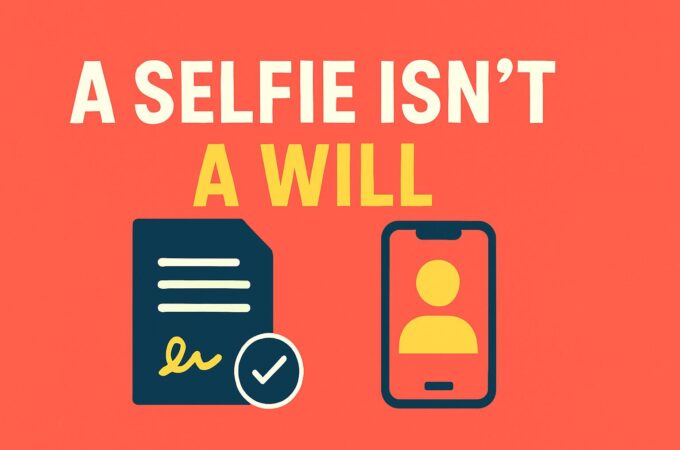This blog post was written by: Dave Madan, Senior Manager, Scotiatrust
This summer, the Montana Supreme Court had to weigh in on a modern question: can a selfie video serve as a person’s last Will? The short answer was no.
In a case that made headlines, the court rejected a man’s video-recorded “selfie Will.” Even though he clearly expressed that he wanted his brother to inherit everything, the court ruled the recording invalid because it wasn’t written, signed, or witnessed—the traditional safeguards that make a Will legally binding (Wall Street Journal).
For estate planning professionals, the case is a reminder that while technology is reshaping how people live, the way they pass on their legacies remains tethered to formality. Video feels compelling. It captures intent, tone, and even emotion. But in the eyes of the law, it doesn’t yet carry the safeguards that prevent fraud, ensure clarity, and give executors certainty.
Here in Canada, we’ve seen gradual movement toward modernization, but not toward video. British Columbia has led the way, recognizing fully electronic Wills since December 2021—including electronic signatures, digital storage, and even remote witnessing (Willful). Saskatchewan followed in May 2023 with similar legislation (Adobe Legal Guide). Alberta has studied the issue closely: the Alberta Law Reform Institute recommended reforms to permit electronic Wills, particularly text-based documents, but stopped short of endorsing video Wills (ALRI Report).
Ontario experimented during the pandemic by allowing virtual witnessing over video calls. It was a temporary measure but showed there is appetite for reform (Barbarian Law). Outside of these provinces, traditional wet-ink Wills with two witnesses remain the standard.
| Province | Electronic Wills (e-signature, digital storage) | Video Wills (selfie-style recordings) | Notes / Status |
|---|---|---|---|
| British Columbia | ✅ Permitted since Dec 2021 (Willful) | ❌ Not valid | First province to legalize fully electronic Wills; remote witnessing also allowed. |
| Saskatchewan | ✅ Permitted since May 2023 (Adobe Legal Guide) | ❌ Not valid | Follows BC model; law updated to recognize e-Wills. |
| Alberta | ⚠️ Not yet legal (ALRI Report) | ❌ Not valid | Reform recommendations made; no legislation passed yet. |
| Ontario | ⚠️ Temporary virtual witnessing allowed during COVID (Barbarian Law) | ❌ Not valid | Virtual witnessing expired; no permanent e-Will legislation. |
| Other Provinces & Territories | ❌ Not permitted | ❌ Not valid | Remain paper-based; handwritten signature and witnesses required. |
The takeaway is that while Canada is cautiously embracing digital estate planning, video Wills are still a step too far. And that’s probably wise for now. A video clip can be spliced, manipulated, or even deepfaked. It can lack context. It can’t prove whether someone was under duress off-camera. The written Will—whether ink on paper or, in BC’s case, a securely stored digital file—offers a consistency and verifiability that courts can trust.
Clients, however, don’t always see it this way. Many assume that “if I say it in a video, it should be enough.” They’ve grown up in a world where video is the dominant medium—more real than paper, more personal than a typed paragraph. But as advisors, it’s our role to bridge that gap between what feels authentic to the client and what the law will enforce.
Stories like the Montana case can be useful teaching tools. They help illustrate that intent is only half the battle—validity is the other. A client may feel reassured recording themselves, but the family left behind could be dragged into a costly dispute if that’s all they rely on. No one wants their estate plan to become a courtroom cautionary tale.
It’s also worth reflecting on how reforms in BC and Saskatchewan are shaping expectations elsewhere. Once people hear that some provinces already accept fully electronic Wills, they may assume video can’t be far behind. We know the distance between a properly executed e-signed document and a 60-second iPhone message is bigger than it looks, but clients don’t always see that nuance. Our job is to explain what’s possible now, what’s on the horizon, and where the hard lines still stand.
Estate planning is as much about managing perception as it is about managing law. Clients want flexibility. They want modern tools. They want to believe their voice—literally—will carry weight. Our task is to guide them toward solutions that are progressive yet enforceable. Today that means steering clear of video Wills, even as we embrace electronic ones where the law permits.
The Montana ruling won’t be the last of its kind. More people will try to leave instructions in unconventional formats, and courts will keep being asked to sort them out. Until legislation catches up, the safest path remains clear: Wills that meet the formal requirements. For now, estate planning may borrow from the digital world, but its foundation is still firmly written.


0 Comments